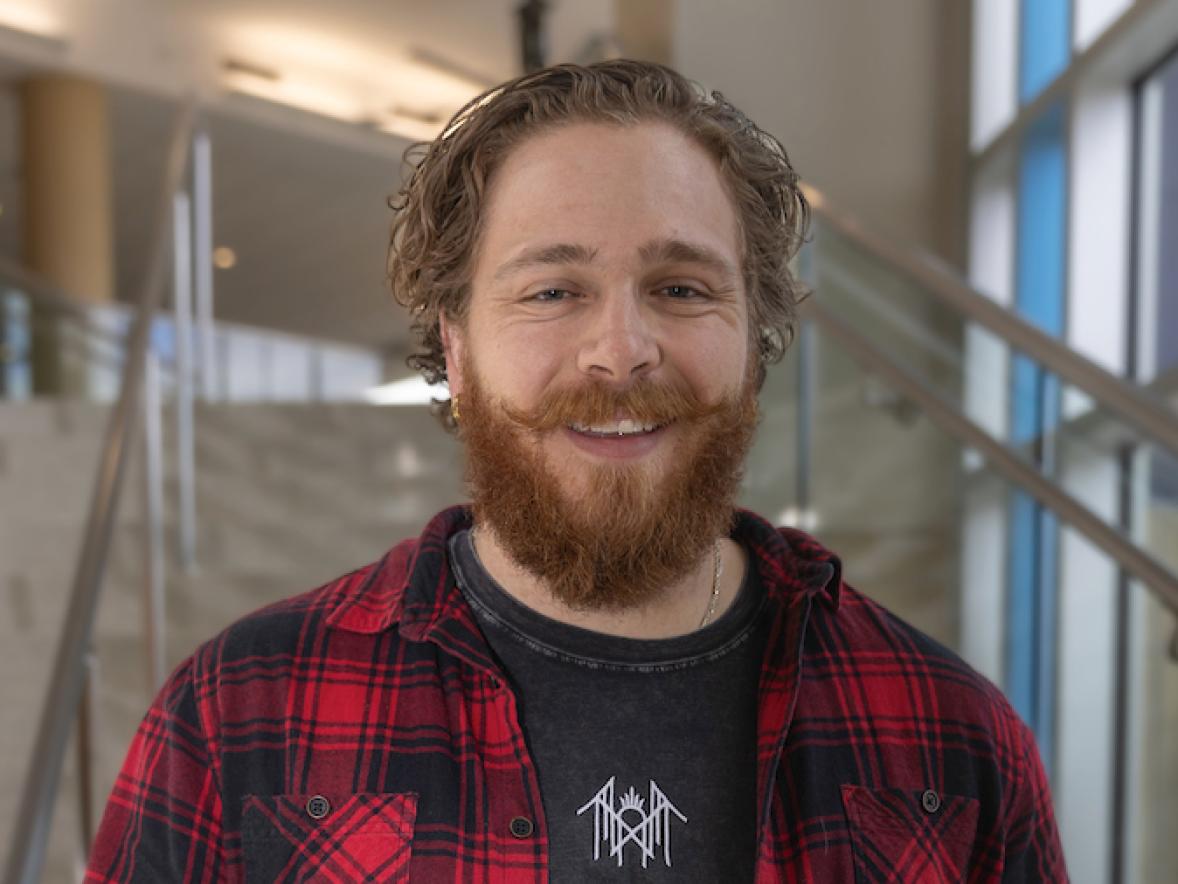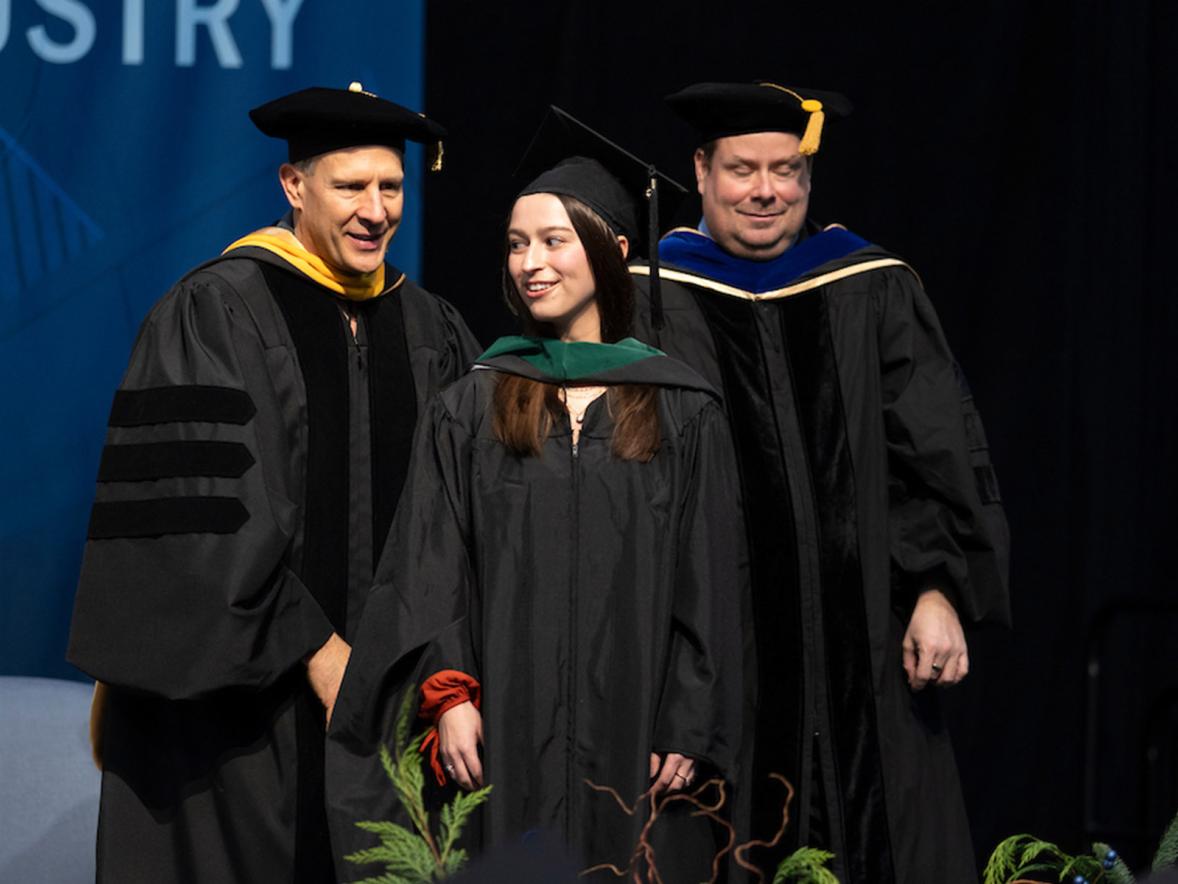UW-Stout's Master of Science (M.S.) in Clinical Mental Health Counseling program prepares students for competent and ethical service in the mental health counseling profession.

Our program is accredited by the Council for Accreditation of Counseling and Related Educational Programs (CACREP).
Degree Concentrations
While our program can be completed without pursuing a concentration, you also can use a portion of your elective credits to develop an area of specialized expertise.
- Child and Adolescent Counseling
- Crisis and Trauma Counseling
- Eating Disorders
- Gerontological Counseling
- Alcohol and Other Drug Abuse Counseling
Program Highlights
- Training and experience in assessment, diagnosis, treatment and prevention, and trauma counseling
- Thorough preparation to conduct individual, family, and group counseling
- State-of-the-art counseling facilities
- Required 150-hour practicum
- Required 600-hour internship
- A rigorous curriculum taught by award-winning faculty
- Excellent employment prospects
Use the Request Information form to receive a program summary and learn more about the Masters of Science degree in Clinical Mental Health Counseling.
Request Information
Program Objectives
- Develop an understanding of the counseling profession and demonstrate an ethical professional counselor identity.
- Engage in advocacy and social justice through interdisciplinary relationships with colleagues, clients, and community members from diverse backgrounds and experiences.
- Employ developmentally and culturally appropriate counseling theories, techniques, and evidenced-based methods of assessment, treatment, and prevention to individuals, groups, families, and the community.
- Recognize human developmental needs, educational and career needs, and implement interventions to support client success.
- Incorporate relevant knowledge, assessment, and evidenced-based counseling services to diverse clients to address various concerns including AODA and crisis and trauma.
- Analyze and implement research-based practice into core counseling areas and use data-informed decision-making practices for program evaluation and management.
- Demonstrate an understanding of formulating and conducting group counseling for diverse populations and mental health concerns.
Program Requirements
- A minimum of 60 credit hours
- There are 48 required and 12 elective credits
- Successful completion of the program’s comprehensive exam or a Master’s thesis
- The comprehensive exam assesses the student's understanding of knowledge and skills necessary for entering the mental health counseling profession. Internship experiences provide training specific to the student's area of interest or formal concentration.
- The thesis option is in place for students who are interested in research and/or planning on pursuing further education beyond the master’s degree. The thesis option also fulfills two credits of the elective course requirements for each student.
- A 150-hour practicum and 600-hour clinical internship
General UW-Stout Graduate School Application
All prospective graduate students at UW-Stout must follow a standard application process through our Graduate School. Beyond that, each graduate program has specific requirements that must be met to be successfully admitted to the program:
Program-Specific Application Requirements
To successfully apply for the program, first complete the UW System Application and receive your Application ID. Then, use this ID to fill out the UW-Stout Graduate Studies Collection Form, where you will provide the following:
- Resume
- Becoming a professional counselor requires personal reflection. Please provide a statement of up to 500 words that addresses both of the following:
- Tell us about your areas of strength and growth in becoming a professional counselor.
- Speak to your interest in our program at UW-Stout and how completing this program will help you achieve your professional goals
- Internal Application | PDF
- Two Personal References (One Form for Each) | Word
- Background Check | PDF
*The Collection Form Site requires an Application ID provided upon completion of the UW-System Application
Review Process
The Clinical Mental Health Counseling faculty review all application materials. Applications are initially rated on:
- GPA
- Coursework and transcripts
- Experience working with others (paid or volunteer)
- Extracurricular activities
- Written materials
- Letters of recommendation
Please note that the GRE is not required for admission into this program.
More students apply than we can admit to the program; therefore, admission is competitive. Twelve students are accepted into the program for the Fall and Spring.
Based on the results of the application reviews, specific applicants are invited to participate in an on-campus interview. Applicants who are invited to interview are usually notified by email within ten days after the application deadline.
On-campus interviews are scheduled on Fridays, usually three to four weeks after the application deadline. Interviews are done in a group format and are required as a part of the application process. At the completion of the interview, all application materials and performance in the group interview are used to make decisions regarding admission to the program. Candidates are notified of their status as soon as possible after the interview process is completed, usually within one week of the interview.
Due to the high volume of applications, the program cannot provide individual feedback to those who were not accepted to the program, but applicants who are not admitted may reapply to the program. It is extremely important to strengthen your resume if you choose to reapply either through volunteering in your community and/or work in the helping professions.
For those students who have struggled with personal addiction to alcohol or drugs, we strongly recommend 12 months of continuous sobriety prior to beginning the program.
Application Deadlines
- February 1: Summer and fall admission
- October 1: Spring admission
Mental Health Counseling Practicum (COUN 793)
This course will assist counselors-in-training in developing their professional helping skills and effective counseling style. Upon completion of this course, students will possess an enhanced comprehension of their professional strengths and limitations related to the helping profession.
Students are responsible for acquiring practicum positions and obtaining approval of the Program Director. Specific placements depend somewhat on the background, experience, maturity and capability of the student at the time of placement, as well as chosen concentration or interest area. No particular kind of placement can be guaranteed prior to the student's entry into the program. Brochures listing a variety of potential practicum sites are provided to students.
Students will attend a minimum of eight seminars of three hours each. During these seminars students will discuss cases and various topics pertinent to the practice of mental health counseling in a variety of mental health settings. Students will also meet individually with a university supervisor at least one hour per week. Students are required to be at their practicum site for a total of 150 hours during the semester, of which 40 of those hours need to be direct client contact hours (individual or group counseling), and students are required to record at least one client session each week using the video equipment provided by their primary instructor. Students are required to complete Counseling Process Lab (COUN 788) prior to taking the practicum course. Read the liability insurance requirements described below.
- The Practicum Handbook lists and describes student and supervisors responsibilities during practicum.
Mental Health Counseling Internship (COUN 794)
Completion of the Clinical Mental Health Counseling program requires an internship experience for students. Two courses are prerequisites for internship: Counseling Process Laboratory (COUN 788) which provides initial development in core counseling skills, reflective listening and establishing counseling relationships; and the Mental Health Counseling Practicum (COUN 793), which offers continued development of professional helping skills and effective counseling style. Internship experiences for students in the Mental Health Counseling program are available through various agencies. Similar to practicum, students are responsible for acquiring an internship site, but may choose to continue in their practicum site for internship.
A total of 600 hours of on-site internship experience is required for the Clinical Mental Health Counseling program. This means students will be expected to spend the equivalent of about 20 hours per week in the internship setting during the 16-week semester. The 600 total hours required for internship can be divided up over two or three semesters with a minimum of two credits required per semester. Supervision for all internships will be provided by professional staff in the setting, and by faculty from the university. Seminar classes will meet bi-weekly and individual supervision sessions are required as part of the internship experience.
- The Student Internship Handbook lists and describes student responsibilities during internship.
This program meets the educational requirements for the following licenses in Wisconsin:
- Professional Counselor
- Substance Abuse Counselor
After completion of degree requirements and graduation from the program, to receive licensure as a Professional Counselor (LPC) in Wisconsin (and all other states), graduates will need to accrue 3,000 hours of supervised counseling experience (at least 1,000 hours of face-to-face client contact) in no less than two years. During this time, individuals must hold a Professional Counselor training license. In addition, graduates need to take and pass the National Counselor Examination and the Wisconsin Statutes and Rules examination. Please note the information listed above is applicable only to Wisconsin, as licensure requirements are determined by the state.
The Alcohol and Drug Abuse Counseling concentration has been approved as a pre-certification education program for the Substance Abuse Counselor (SAC) and Clinical Substance Abuse Counselor (CSAC) certifications by the Department of Regulations and Licensing. For graduates with the AODA Counseling concentration, this accreditation allows for 2,000 hours of supervised work experience toward obtaining the Substance Abuse Counselor credential and 4,000 hours of supervised work experience toward obtaining the Clinical Substance Abuse Counselor credential. The AODA Counseling Concentration will also provide the necessary preparation for the Master Addiction Counselor (MAC) credential offered through NBCC. Similar to the Professional Counseling licensure, this information applies only to the state of Wisconsin.
Information about the necessary criteria and application forms for licensure can be found online through the Department of Safety and Professional Services. For information about the licensing boards in other states as well as information about the National Counseling Examination, please refer to the National Board for Certified Counselors.
Graduates from the Clinical Mental Health Counseling program have enjoyed gainful employment in a wide variety of organizations and titles:
| Employers | Positions |
|---|---|
|
|
In the 2022-2023 academic year, 27 new students enrolled in the Clinical Mental Health Counseling program at the University of Wisconsin-Stout. Specifically, 56 students applied for a fall 2022 start, of which 16 were admitted. Fourteen of those students began coursework, while 2 deferred to spring 2023. Additionally, we had 23 students apply for a spring 2023 start; 11 new students were admitted along with the 2 deferrals from fall 2022, for a total of 13 students starting in spring 2023
In the 2021-2022 academic year, 30 new students enrolled in the Clinical Mental Health Counseling program at the University of Wisconsin-Stout. Specifically, 56 students applied for a fall start, of which 17 were admitted, and all 17 began coursework. Additionally, we had 28 students apply for a spring 2022 start; 15 were admitted and began the program.
Upon admission, each student meets individually with the Program Director to design a course sequence that best meets their schedule and life; program plans are created individually. UW-Stout allows up to seven years for a student to complete their coursework. In general, about 75% of students finish the program in two years. More specific information about completion rates is listed below. See past annual reviews posted on the CMHC website for previous application and acceptance data.
Program Outcomes Reports
- Program Outcomes Report 2023-2024 [PDF]
- Program Outcomes Report 2022-2023 [PDF]
- Program Outcomes Report 2021-2022 [PDF]
- Program Outcomes Report 2020-2021 [PDF]
- Program Outcomes Report 2019-2020 [PDF]
- Program Outcomes Report 2018-2019 [PDF]
- Program Outcomes Report 2017-2018 [PDF]
- Program Outcomes Report 2016-2017 [PDF]
- Program Outcomes Report 2015-2016 [PDF]
- Program Outcomes Report 2014-2015 [PDF]
- Program Outcomes Report 2013-2014 [PDF]
Assessment Reports
- Assessment in the Major 2016-2017 [PDF]
- Assessment in the Major 2015-2016 [PDF]
- Assessment in the Major 2013-2014 [PDF]
- Assessment in the Major 2012-2013 [PDF]
- Assessment in the Major 2011-2012 [PDF]
- Assessment in the Major 2010-2011 [PDF]
- Assessment in the Major 2009-2010 [PDF]
Advisory Committee Members
| Julie | Bates-Maves | Professor | UW-Stout |
| Erik | Feia | Counselor | River City Counseling Center |
| Andy | Felton | Associate Professor | UW-Stout |
| Lindsay | Kjolsing Sather | Owner | Valley Counseling Center |
| John | Klem | Professor; Program Director | UW-Stout |
| Tyler | Miller | School Psychologist | Menomonie High School |
| Ashley | Walton Beal | Licensed Counselor, Counseling Center | UW-Eau Claire |
| Wendy | Winger | Clinical Coordinator | Dunn County Human Services |
| Alex | Anderson | Counselor | Uplift Counseling Center |
| Sara | Bowe | Counselor | Uplift Counseling Center |
| Matthew | Roskowski | Counselor; Groups Coordinator | UW-Stout Counseling Center |
| Chasidy | Faith | Licensed Psychologist; Director, Student Counseling Center | UW-Stout |
| Michael | Veldhuis | Counselor | Park Avenue Treatment Center |
| Lindsay | Woodbridge | Assistant Professor | UW-Stout |







